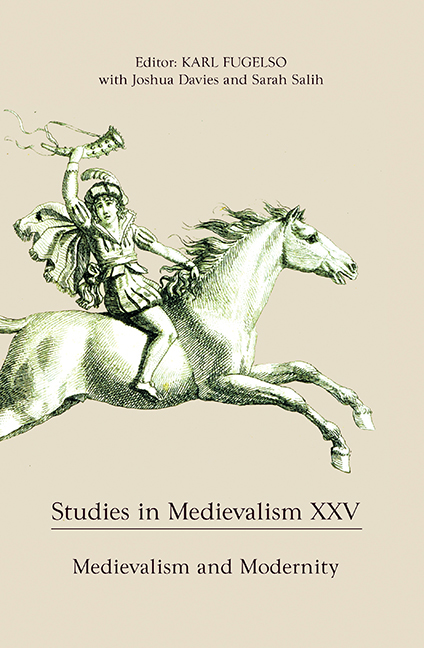Book contents
- Frontmatter
- Studies in Medievalism
- Acknowledgments
- Contents
- List of Illustrations
- Volume XXV 2016
- Editorial Note Karl Fugelso
- I Medievalism and Modernity: Some Perspective(s)
- II Medievalist Visions
- Introduction
- In/visible Medieval/isms
- Art, Heritage Industries, and the Legacy of William Morris in Michel Houellebecq's The Map and the Territory
- Travel in Space, Travel in Time: Michael Morrow's Approach to Performing Medieval Music in the 1960s
- Imagining Medieval Chester: Practice-based Medievalism, Scholarship, and Creativity
- The Anachronic Middle Ages: Public Art, Cultural Memory, and the Medievalist Imagination
- Medievalisms of Moral Panic: Borrowing the Past to Frame Fear in the Present
- Extra-Temporal Place Attachment and Adaptive Reuse: The Afterlives of Medieval English Anchorholds
- Here Be Dragons: Mapping Space and Time, Medieval and Modern
- Contributors
- Miscellaneous Endmatter
Introduction
from II - Medievalist Visions
Published online by Cambridge University Press: 05 July 2016
- Frontmatter
- Studies in Medievalism
- Acknowledgments
- Contents
- List of Illustrations
- Volume XXV 2016
- Editorial Note Karl Fugelso
- I Medievalism and Modernity: Some Perspective(s)
- II Medievalist Visions
- Introduction
- In/visible Medieval/isms
- Art, Heritage Industries, and the Legacy of William Morris in Michel Houellebecq's The Map and the Territory
- Travel in Space, Travel in Time: Michael Morrow's Approach to Performing Medieval Music in the 1960s
- Imagining Medieval Chester: Practice-based Medievalism, Scholarship, and Creativity
- The Anachronic Middle Ages: Public Art, Cultural Memory, and the Medievalist Imagination
- Medievalisms of Moral Panic: Borrowing the Past to Frame Fear in the Present
- Extra-Temporal Place Attachment and Adaptive Reuse: The Afterlives of Medieval English Anchorholds
- Here Be Dragons: Mapping Space and Time, Medieval and Modern
- Contributors
- Miscellaneous Endmatter
Summary
The genesis of the essays in this cluster was an exhibition held at King's College London in spring 2013. The exhibition, entitled Medievalist Visions and curated by Joshua Davies, Sarah Salih, and Beatrice Wilford of the English Department at King's, and Catherine Sambrook, King's Special Collections Librarian, displayed material from across the disciplines of art and design, literature, theater, cinema, and architecture to explore ideas of historical authenticity, cultural translation, and appropriation in works of creative medievalism. It included items loaned by the Victoria and Albert Museum, Lambeth Palace Library, the Geffrye Museum, Senate House Library, and King's College London's Foyle Special Collections Library, plus a selection of specially commissioned work by artists, one of whom, Paddy Molloy, has contributed an essay to this collection. Most of the essays in this cluster were either presented at a study day held at King's to coincide with the exhibition or at linked sessions at the Leeds International Medieval Congress in July 2013.
One of the most iconic items displayed in the exhibition was a copy of the 1892 Kelmscott Press edition of Reynard the Fox, an item that speaks eloquently of some of the aims of the exhibition and this cluster. Kelmscott Press was founded by William Morris in 1890 and, like Morris's 1896 edition of Chaucer's complete works illustrated with woodcuts by Edward Burne Jones, this edition of Reynard is an impressive feat of design. The opening page is a vision of intertwining plant scrolls, and the text is marked by decorative initials throughout. It was published in a limited run of 300 copies (of which the library's copy is one), and ten copies were printed on vellum. As Louise D'arcens explores (below), Morris's life and work stand at a meeting point between capitalist, socialist, and medievalist traditions. While Morris understood the Middle Ages as a point of escape from capitalist modernity, his scholarly and poetic work was funded by the success of his design company. This edition of Reynard therefore also occupies a territory interrogated in the essays by Davies, Ed Breen, Catherine Clarke, and Molloy, that is, the space between the creative and the critical. The Kelmscott edition reprinted text prepared by William Caxton in 1481, itself a translation of a Dutch version of Reinaerts historie that was composed in 1479.
- Type
- Chapter
- Information
- Studies in Medievalism XXVMedievalism and Modernity, pp. 47 - 52Publisher: Boydell & BrewerPrint publication year: 2016

